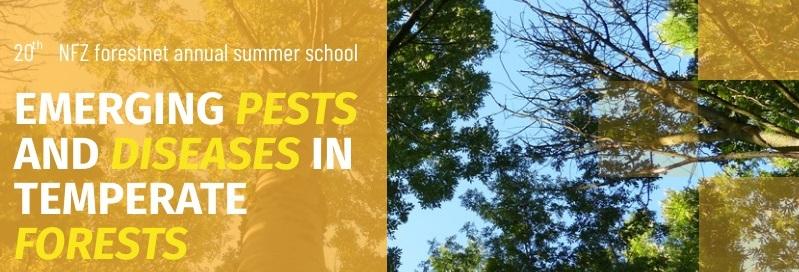01 July 2022 Status Ended
Champenoux, near Nancy
NFZ forestnet annual summer school: emerging pests and diseases in temperate forests
Background

Governments worldwide have implemented appropriate precautions in response to the Covid-19 pandemic, including restrictions on international travel. Therefore to ensure that the international participants will be able to travel to France in good conditions, the scientific committee decided to postpone the 20th NFZ summer school to July 2022.
European forests have doubled in size since the mid-19th century, but they are facing new threats such as climate change. Another major concern is the emergence of new pests and diseases that cause decline of forest trees. The causes of these emerging issues are multiple, such as: the introduction of exotic pests and diseases, climate change, and changes in forestry practices. Most introductions are accidental and linked to increased international trade, which removes many natural barriers to the dispersal of organisms, and leads to the redistribution of many animal, plant and microbial species between continents. Some of these enemies (insects, nematodes, fungi, bacteria or viruses) cause significant economic losses and pose a threat to biodiversity conservation. Beyond the effects on wood production, the functioning of the entire ecosystem may be threatened, as well as its biodiversity and, through it, the production of goods and services provided to society.
The Chalara ash dieback, the sudden larch death, the Dothistroma needle blight of pines, the pine wood nematode, and the Asian chestnut gall wasp are some of the recent emerging species in Europe. Other diseases and pests, such as the American oak wilt fungus, or the emerald ash borer, are major threats on our doorstep. These pests and diseases are at the centre of the concerns of institutional actors in European plant health surveillance, and are of increasing concern to forest managers.
Topics
- Role of climate change in pest and disease emergence
- Invasion biology and biological control
- Risk assessments
- Control and impact
- Management of invasive pests and pathogens
- Invasion biology of emerging pests and diseases
About the summer school
It aims to....
... present the state of knowledge on some emerging forest pests and diseases through case studies. It will also focus on risk management, detection, monitoring and control methods and include classes, tutorials, discussion sessions, working groups and a field trip to the Vosges forests.
Each day will focus on...
...a specific topic concerning emerging pests and diseases in European temperate forests. The course will consist of a 5-day cycle of lectures, discussions, interactive learning activities, and moderated forums provided by international experts.
The summer school is designed for..
...PhD students, young researchers, and Master's students interested in understanding the biology and the epidemiology of emerging pests and diseases in temperate forests, and gaining insight into the consequences for forest management.
Venue: The training course will be held on the premises of INRAE at Champenoux, France.
Cost: No registration fees. Participants will cover their own travel and accommodation costs.
